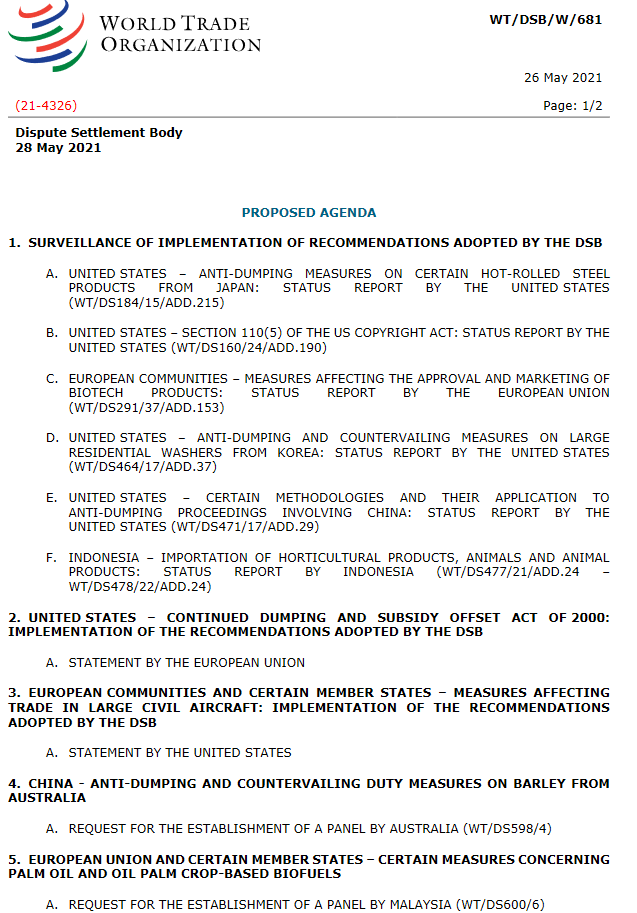
State of play in the #WTOAgricultureNegotiations following meetings on May 25, 27.
• 5 months before the ministerial conference there's little sign that members are moving closer to any shared positions. Substantial gaps remain on almost everything
1/10 wto.org/english/news_e…
• 5 months before the ministerial conference there's little sign that members are moving closer to any shared positions. Substantial gaps remain on almost everything
1/10 wto.org/english/news_e…
• The Cairns Group and African Group issued a joint statement calling for fairer agricultural trade by cutting domestic support that distorts markets. Getting the two groups together was an achievement, but the statement is broad. It doesn't say how
2/10 wto.org/english/news_e…
2/10 wto.org/english/news_e…
• The talks look busy with a lot of new submissions, particularly on domestic support. But they all come from individual members of the Cairns Group (lobbying for far-reaching liberalisation) plus Ukraine.
3/10 wto.org/english/news_e…
3/10 wto.org/english/news_e…
The Cairns Group: Argentina, Australia, Brazil, Canada, Chile, Colombia, Costa Rica, Guatemala, Indonesia, Malaysia, New Zealand, Pakistan, Paraguay, Peru, Philippines, South Africa, Thailand, Uruguay, Vietnam
4/10 wto.org/english/tratop…
4/10 wto.org/english/tratop…

• The new submissions on domestic support propose new approaches for curbing the subsidies. Even if new ideas eventually catch on, that takes time for clarification and debate. Eg, the proposal for "proportionality" in cutting support ⬇️.
5/10 wto.org/english/news_e…
5/10 wto.org/english/news_e…

• So the best we expect on domestic support, called a priority in the #wtoAgricultureNegotiations, is an agreement on a work programme after the year-end ministerial conference.
• Even that is complicated because of "public stockholding"
6/10 wto.org/english/news_e…
• Even that is complicated because of "public stockholding"
6/10 wto.org/english/news_e…
• This is not directly about stockholding, but how the stocks are acquired. Purchases at government-set prices (not market) are deemed subsidised. The "technical issues" in the WTO news ⬇️ are actually central to avoiding effects on other countries.
7/10 wto.org/english/news_e…
7/10 wto.org/english/news_e…

• More on "public stockholding" here ⬇️. At the moment it's shielded from legal challenge.
Can members spring a surprise and agree on anything different?
8/10 tradebetablog.wordpress.com/2020/08/24/rhe…
Can members spring a surprise and agree on anything different?
8/10 tradebetablog.wordpress.com/2020/08/24/rhe…
• Also deadlocked: the "special safeguard mechanism" for developing countries to temporarily impose high tariffs, explained here ⬇️. It's difficult to see how this can be agreed outside a broad package of tariff cuts.
Will this surprise us too?
9/10 tradebetablog.wordpress.com/2020/08/30/rhe…
Will this surprise us too?
9/10 tradebetablog.wordpress.com/2020/08/30/rhe…
• And then there are COVID-19-related issues including export restrictions in general and the proposed exemption for the World Food Programme. Can they surprise us on this as well?
Next meeting, tentatively June 12.
10/10 wto.org/english/news_e…
Next meeting, tentatively June 12.
10/10 wto.org/english/news_e…
• • •
Missing some Tweet in this thread? You can try to
force a refresh





















